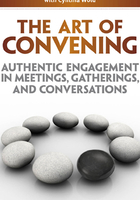
FOREWORD
Called to Convene
Writing this foreword has been a rare and special privilege. I’ve spent many hours with Craig and Patricia Neal, since they live in my home city of Minneapolis. I have experienced their call to convene. They bring to that calling and to the community here a very special presence. They show us how to be completely human while at the same time understanding the complex and fragile enterprise of convening work. For their courage and their willingness to be transparent companions and guides to their colleagues near and far, we are grateful.
The Heartland authors invite us into the circle that is their calling. They take us into their heart lands where the spirit of convening resides and where we connect with our inner wisdom. They gently prod us to exit the fast lane and move into the slow lane of purpose and practice, which summons us to heed our own call to convene. Many of us are called to convening work by a sense that we can make a difference in someone’s life, in our world.
Convening was, and is, one of the most powerful, life-altering forces in the universe. The genesis of this book can be traced back to the art of convening to energize communities and stir us to survive and envision what might be possible. The modern practice of convening has ancient roots. There was a time when spirit, work, and life were integrated. Early peoples hunted, gathered, cooked, and naturally convened. The poet T. S. Eliot described those roots precisely when he asked in his poem “The Rock,”
Where is the wisdom we have lost in knowledge?
Where is the knowledge we have lost in information?
This book recovers that lost wisdom we are yearning for today.
On its surface, the book shares pioneering practices on “how to” be a successful convener. But that is not the core gift of the book. The book is distinct and valuable because it is a clear expression of the integrity and spirit of its authors. This gift of consistently ensuring that words and practices are of one spirit is just what is too often missing in the convening process itself.
Heeding the call to convene requires a clear choice—the choice to be authentically ourselves. Each convener is an experiment of one. Our calling is like our signature, footprint, or thumbprint—uniquely ours. Being authentically engaged means that we realize we are here to contribute to life on earth something that no one else can contribute in quite the same way.
One golden thread woven into the fabric of this book is the embrace of the spiritual essence of our lives. Many organizations are a reflection of the rational mind. They operate on strictly rational models as a basis for leadership and behavior. It is often this exclusive belief that gets in the way of the very transformation or engagement they are seeking.
Organizations are human communities, driven as much by emotions and spirit as by reason. Spirit is the energy fundamental to authentic engagement. It is the animating or activating force in great convening work. When we are in touch with spirit, we feel whole and alive. If we split spirit out of our lives or deny it in our work or community, we feel a sense of deadness. This book restores wholeness—it brings aliveness back to life, work, and community.
Many, many books come across my reading table each year, but it has been a long time since one of them affected me as much as this one has. It has struck some deep chords within me. It has reminded me that each gathering is a sacred adventure where even our struggles can lead us to what mythologist Joseph Campbell called “the rapture of being alive.” You hold in your hands a wise book. I hope it brings you alive like it did me.
—Richard J. Leider
Author of The Power of Purpose: Find Meaning, Live Longer, Better and coauthor of Repacking Your Bags: Lighten Your Load for the Rest of Your Life